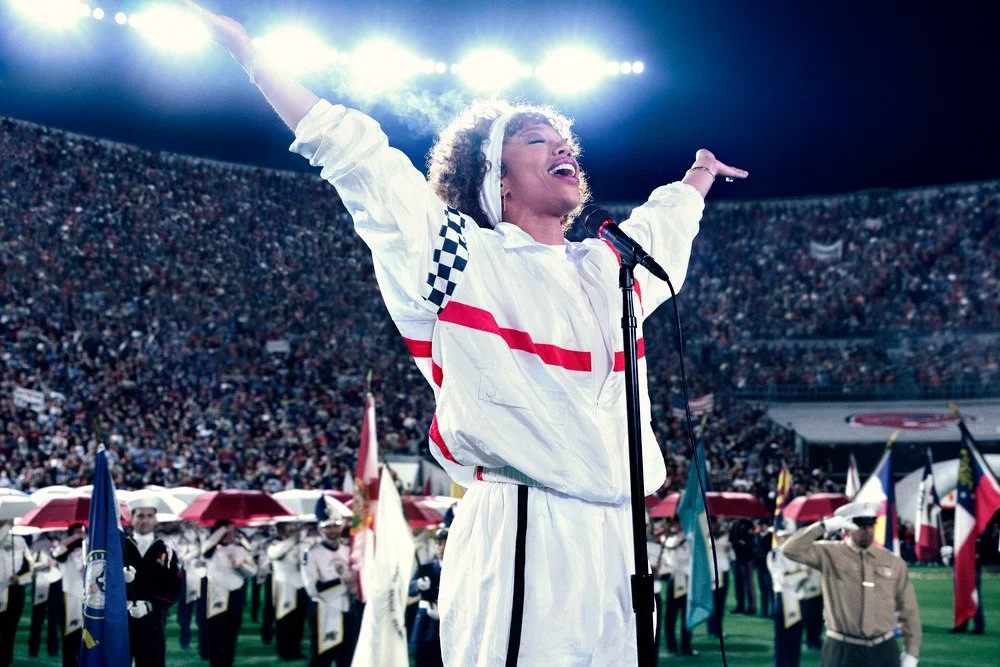Review: 'I Wanna Dance With Somebody' covers Whitney Houston's tumultuous career without adding much about her life or her death.
The musical biopic “I Wanna Dance With Somebody” isn’t a bad movie, really — not to say that it’s good — but it’s a fundamentally pointless one.
There’s no earthly reason we need to see an actor, even a talented one like Naomi Ackie, imitate the singer Whitney Houston through re-enactments of her music videos and noteworthy live performances, lip-synching “The Voice” (a moniker that the movie beats into the audience’s head). Nor do we need to watch Ackie go through the beats of Houston’s life, from singing in her mom’s church choir in 1983 to preparing the cocaine that would hasten her death in a hotel bathtub in 2012.
Those of us of a certain age watched it all happen in real time. Plus, it was only four years ago that director Kevin Macdonald made “Whitney,” a documentary that covered the same ground and in less time. (This movie runs an inexcusably slow two hours and 26 minutes.)
The story starts in Houston’s New Jersey church, where her mother — the R&B singer Cissy Houston — (Tamara Tunie) is choir director. Whitney also sings backup for Cissy’s nightclub act, and on one night Cissy fakes that her voice has given out, so Whitney must go on in her place, singing “The Greatest Love of All.” What Whitney doesn’t know, and Cissy and the audience do, is that Clive Davis (Stanley Tucci), the influential head of Arista Records, is in the audience.
After declaring Whitney, after one listen, to be “the greatest voice of her generation,” Davis signs Whitney to a record contract. Then they start talking music, and Whitney declares she wants to sing “great songs” that demonstrate her vocal range — and she’s agnostic about what genre those songs come in.
A montage later, and Whitney and Clive have found some of the songs for her first album, “Whitney Houston” — songs like “Saving All My Love for You” and “How Do I Know,” which become No. 1 hits and cement her stardom.
Intercut with Whitney’s rise are scenes where she meets Robyn Crawford (Nafessa Williams), who becomes the singer’s sometime girlfriend and full-time paid creative advisor — a move that rankles her manager, who’s also her father, John Houston (Clarke Peters). Daddy wants to protect Whitney’s image, so he tells his daughter to start being seen in public dating men.
Whitney resists this order at first, but then she meets R&B singer Bobby Brown (Ashton Sanders) at the Soul Train Awards. Dating Bobby satisfies her father, and it helps fend off criticism that Whitney’s music is too white. (One scene where Whitney defiantly puts a radio interviewer in his place may be the only authentic moment in the movie.) As we know, marrying Brown leads to its own problems — though, as Whitney herself says at one point, the drugs were there before he was.
Director Kasi Lemmons — who scored with a different biopic, “Harriet,” in 2019 — gets the most out of her actors, with Tunie, Tucci, Peters, Williams and Sanders all giving solid support to Ackie’s dynamic central turn as Whitney. Lemmons also deploys all the special effects wizardry at her disposal to re-create some of Whitney’s most famous performance moments, from her debut on “The Merv Griffin Show” through her Super Bowl rendition of “The Star-Spangled Banner” to her “comeback” performance on “Oprah.”
The weak link is the screenplay, and the culprit is writer Anthony McCarten, whose resumé includes fictionalized life stories of Freddie Mercury (“Bohemian Rhapsody”), Winston Churchill (“Darkest Hour”) and Stephen Hawking (“The Theory of Everything”). The fact that all three of those movies earned Oscars for their lead actors doesn’t dispel the fact that McCarten’s approach is tediously narrow, as creative as a paint-by-numbers set. It traffics in the same cliches “Bohemian Rhapsody” did (including a discomfort with discussing the main figure’s homosexuality), cliches that parodies like “Walk Hard; The Dewey Cox Story” exploded years ago.
(It’s worth mentioning that Davis and Pat Houston, Whitney’s sister-in-law and her manager late in life, are among the many producers on the film, so there’s a limit to how much tea is being spilled.)
“I Wanna Dance With Somebody” delivers a stinging criticism of Houston’s career, and I don’t think the filmmakers meant to do so. Her greatest moments — her Super Bowl rendition of the national anthem, her cover of Dolly Parton’s “I Will Always Love You” (for “The Bodyguard”) and her 1994 American Music Awards performance (a showstopper medley that included cuts from “Porgy and Bess” and “Dreamgirls”) — all highlight Houston’s vocal chops on other people’s songs. Houston may have been “The Voice,” but the movie’s inadvertent message is that she didn’t have anything to say.
——
‘I Wanna Dance With Somebody’
★★
Opens Friday, December 23, in theaters. Rated PG-13 for strong drug content, some strong language, suggestive references and smoking. Running time: 146 minutes.
